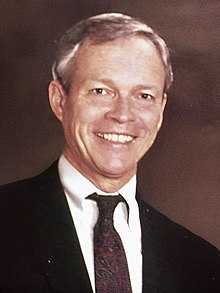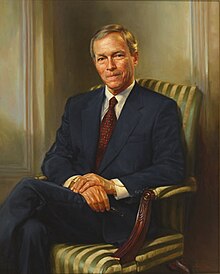
John Ellis "Jeb" Bush is an American politician and businessman who served as the 43rd governor of Florida from 1999 to 2007. A member of the Bush political family, he was an unsuccessful candidate for president of the United States in the 2016 Republican primaries.
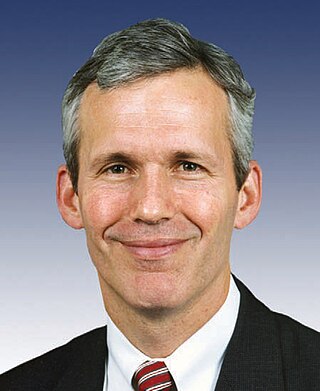
James Oscar Davis III is an American politician from the U.S. state of Florida. He is a Democrat and served in the U.S. House of Representatives from 1997 to 2007, representing Florida's 11th congressional district. He was the Democratic nominee for governor of Florida in the 2006 election, but was defeated by Republican Charlie Crist.
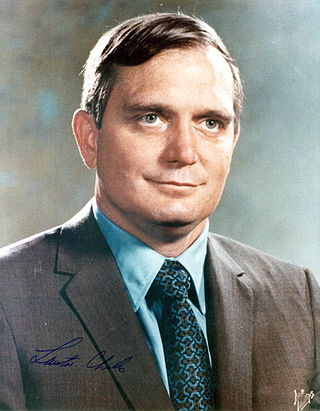
Lawton Mainor Chiles Jr. was an American politician and military officer. A member of the Democratic Party, he served as a United States senator from Florida from 1971 to 1989 and as the 41st governor of Florida from 1991 until his death in 1998.

Reubin O'Donovan Askew was an American politician, who served as the 37th governor of Florida from 1971 to 1979. A member of the Democratic Party, he served as the 7th U.S. trade representative from 1979 to 1980 under President Jimmy Carter. He led on tax reform, civil rights, and financial transparency for public officials, maintaining an outstanding reputation for personal integrity.

The 1970 United States Senate elections was an election for the United States Senate. It took place on November 3, with the 33 seats of Class 1 contested in regular elections. Special elections were also held to fill vacancies. These races occurred in the middle of Richard Nixon's first term as president. The Democrats lost a net of three seats, while the Republicans and the Conservative Party of New York picked up one net seat each, and former Democrat Harry F. Byrd Jr. was re-elected as an independent.

The 1988 United States House of Representatives elections was an election for the United States House of Representatives on November 8, 1988, to elect members to serve in the 101st United States Congress. They coincided with the election of George H. W. Bush as president. Although Bush won with a strong majority, his Republican Party lost a net of two seats to the Democratic Party, slightly increasing the Democratic majority in the House. It was the first time since 1960 that an incoming president's party lost seats in the House.

Robert A. Butterworth Jr. is an American lawyer and politician from the state of Florida.

The 2006 Florida gubernatorial election took place on November 7, 2006. Incumbent Republican Governor Jeb Bush was term-limited, and could not run for reelection to a third consecutive term. The election was won by then-Republican Charlie Crist, the state's Attorney General. The election was notable in that for the first time, the state elected a Republican governor in three consecutive elections.
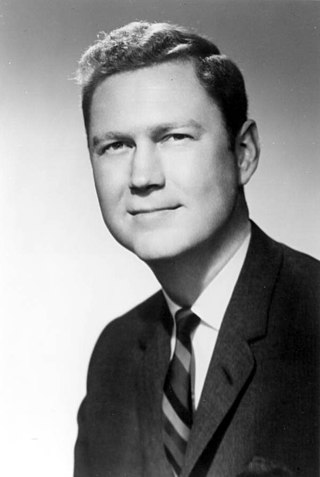
William Dawson Gunter Jr. was an American politician from the state of Florida.

The 1990 Florida gubernatorial election took place on November 6, 1990. Incumbent Republican governor Bob Martinez ran for a second term in office, but was defeated by Democratic challenger Lawton Chiles, a former U.S. senator.

The 1970 Florida gubernatorial election took place on November 3, 1970, to determine the governor and lieutenant governor of Florida, concurrent with the election to the United States Senate, elections to the United States House of Representatives, and various state and local elections.

The 1970 United States Senate election in Florida was held on November 3, 1970. Incumbent Democratic U.S. Senator Spessard Holland decided to retire instead of seeking a fifth term. During the Democratic primary, former Governor C. Farris Bryant and State Senator Lawton Chiles advanced to a run-off, having received more votes than Speaker of the Florida House of Representatives Frederick H. Schultz, attorney Alcee Hastings, and State Representative Joel T. Daves III. Chiles soundly defeated Bryant in the run-off election, scoring a major upset due to his comparatively small name recognition prior to the election. To acquire name recognition and media coverage, Chiles walked about 1,003 miles (1,614 km) across the state of Florida and was given the nickname "Walkin' Lawton".

Rick Dantzler is an American lawyer, former Florida politician, and a member of the Democratic Party. From Winter Haven, Dantzler served in the Florida House of Representatives from 1982 to 1990, and in the Florida Senate from 1990 to 1998. He was Buddy MacKay's running mate in the 1998 Florida gubernatorial election; they lost to Jeb Bush and Frank Brogan. From 2014 to 2017, Dantzler was President Obama's appointed Florida State Executive Director of the Farm Service Agency.

The 1988 United States Senate election in Florida was held on November 8, 1988. Incumbent Democratic U.S. Senator Lawton Chiles decided to retire instead of seeking a fourth term. Republican Connie Mack III won the open seat, becoming the first Republican to hold this seat since Reconstruction in 1875.

The 1994 Florida gubernatorial election was held on November 8, 1994. Incumbent Democratic governor Lawton Chiles won re-election over Republican Jeb Bush, who later won Florida’s governorship in 1998 when Chiles was term-limited. This race was the second-closest gubernatorial election in Florida history since Reconstruction, due to the strong Republican wave of 1994. As of 2024, this is the last time a Democrat was elected Governor of Florida.

The 1982 United States Senate election in Florida was held on November 2, 1982. Incumbent Democratic U.S. Senator Lawton Chiles won re-election to a third term.
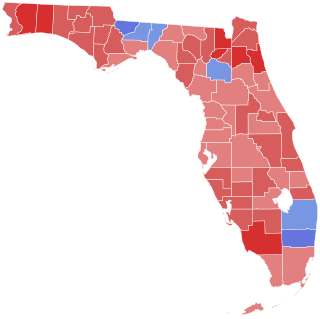
The 1998 Florida gubernatorial election was held on November 3, 1998, to determine the Governor for the State of Florida. Two-term Democratic incumbent Governor Lawton Chiles was term-limited and could not run for re-election. John Ellis "Jeb" Bush, who had previously run for governor in 1994 was the Republican nominee, and incumbent Lieutenant Governor Kenneth Hood "Buddy" MacKay was the Democratic nominee. Bush defeated MacKay by nearly 11% of the vote, and won his first of two terms as governor.
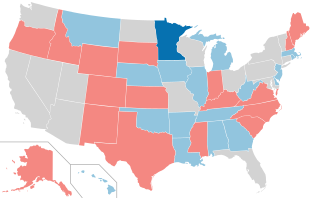
The 1990 United States elections were held on November 6 and elected the members of the 102nd United States Congress. The elections occurred in the middle of Republican President George H. W. Bush's term and during the Gulf War. The Democratic Party slightly built on their control of Congress.
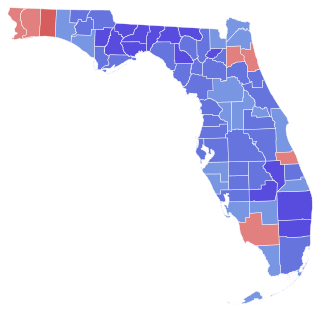
The 1998 Florida Commissioner of Agriculture election took place on November 3, 1998, to elect the Florida Commissioner of Agriculture. The incumbent, Robert B. Crawford, easily defeated Republican Rich Faircloth to win re-election; he served under three governors, Lawton Chiles, Buddy MacKay, and Jeb Bush.
